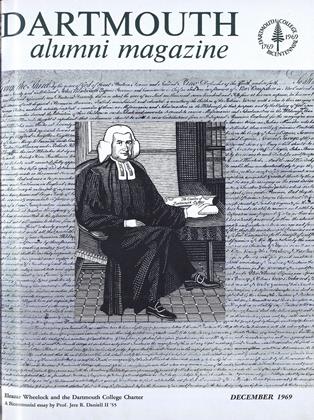Since childhood DAVID V. PICKER '53 has had one main ambition - to follow in the footsteps of his father and grandfather in the motion picture industry. In his application for entrance to Dartmouth, in answer to the question "Have you planned on any definite vocation?" his reply was succinct - "Motion pictures will be my industry."
That was over twenty years ago. Since that time he has climbed the steps, first as an apprentice in sales promotion, then as executive assistant to the vice-president, then as executive vice-president, and finally, in early 1969, as president of United Artists Corporation.
In reaching these high posts he follows the career pattern of his father, Eugene Picker, formerly president of Loew's Theaters, and currently president of Trans-Lux Entertainment Division. His grandfather, the late David V. Picker, was also a pioneer exhibitor and vice-president of Loew's, Inc.
In its fifty years United Artists has had a tumultuous history, after being founded by Charlie Chaplin, Mary Pi ckford, Douglas Fairbanks, and David W. Griffith. Its landmark films included City Lights, Robin Hood, and The Three Musketeers. It is now the distribution agency for such eminent film makers as Goldwyn, Selznick, Korda, and Walt Disney.
In the late 1940's, with monetary losses and a dire shortage of film merchandise, United Artists was not able to secure a single new film for over twelve months. Receivership was threatened, and a group which included David's uncle, Arnold Picker, took over the management of the corporation.
By early 1951 the company's total world gross had fallen to a level of only a few million dollars a year, and the losses, at times, were sky-rocketing to as much as $100,000 a week. But since that year, with a single exception, United Artists has shown black instead of red in its profit and loss statements.
By 1954, through the financing of motion pictures produced by independents, thus providing sources of supply of new films, United Artists came to have an ownership interest in almost all the pictures it distributed. It was about this time that Dave Picker became an operating influence. His sixth sense told him that success could be achieved only by the shrewd selection of pictures that would have box-office appeal, and picking them became his most important task. That he soon succeeded in a big way is proven by the fact that United Artists has received six of the last thirteen Academy Awards in the category of Best Picture of the Year. Besides the famed Tom Jones, these have included Aroundthe World in Eighty Days, The Apartment, and West SideStory.
The New York Times of August 3, 1969 commented in a lead article that "intuition still remains the keystone on which most money-making films are created. It is necessary to have a feel for what the public wants at a particular moment, combined with a healthy knowledge of current attraction." The case of Midnight Cowboy was cited. Produced at a cost of $3 million, the gross after two months of showings was double that of Tom Jones, and it is predicted that eventually United Artists will receive as its portion of distributed earnings close to $6 million. Tom Jones has, with an investment of $1.2 million, already grossed $23 million, after it had first been turned down by several competing companies.
Dave Picker is described as a knowledgeable, persuasive talker, whose educated voice easily cuts through the loud talk which is common to movie conferences. Boasting a six-foot-three-inch frame he breaks film tradition still further by smoking a pipe instead of a cigar.
Since 1965 the English Department at Dartmouth has featured a seminar course on the History of Motion Pictures, and David Picker has repeatedly appeared as a lecturer in this series. He is presently looking forward to his next appearance during the spring term of 1970.
David Picker '53 (r) receiving from Jack Lemon the Oscarfor Tom Jones, voted the best movie of the year in 1964.
 View Full Issue
View Full Issue
More From This Issue
-
 Feature
FeatureEleazar Wheelock and the Dartmouth College Charter
December 1969 By JERE R. DANIELL II '55, -
 Feature
FeatureEleazar: The Man Behind the Myth
December 1969 By John Hurd '21 -
 Feature
FeatureTHE WHEELOCK SUCCESSION
December 1969 -
 Feature
FeatureTV News Editor
December 1969 -
 Article
ArticleCharter of Dartmouth College
December 1969 -
 Article
ArticleWith the Big Green Teams
December 1969
HAROLD BRAMAN '21
-
 Article
ArticleFor Whom the Bell Tolled
February 1962 By HAROLD BRAMAN '21 -
 Feature
FeatureHORNING: Invention of the Devil
DECEMBER 1963 By HAROLD BRAMAN '21 -
 Article
ArticleAle Man
JANUARY 1969 By HAROLD BRAMAN '21 -
 Article
ArticleLens Artist
FEBRUARY 1969 By HAROLD BRAMAN '21 -
 Article
ArticleDeep Sea Explorer
JUNE 1969 By HAROLD BRAMAN '21 -
 Article
ArticleNephrologist
NOVEMBER 1969 By HAROLD BRAMAN '21
Features
-
 Feature
FeatureA New Look for Reunions
JULY 1966 -
 Feature
FeatureIt Was A Dartmouth Jinx All the Time
November 1960 By AMOS N. BLANDIN '18 -
 FEATURES
FEATURESDispatches from the Fringe
NOVEMBER | DECEMBER 2023 By CHELSEA EDGAR -
 COVER STORY
COVER STORYThe World According To Rembert
JULY | AUGUST 2016 By Jennifer Wulff ’96 -
 COVER STORY
COVER STORYEarth Mother
JAnuAry | FebruAry By KEVIN NANCE -
 Feature
FeatureZen and the Art of Corporate Maintenance
JANUARY/FEBRUARY 1985 By Shelby Grantham

